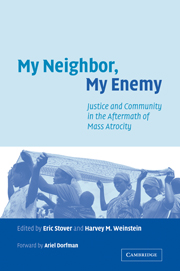Book contents
- Frontmatter
- Contents
- List of contributors
- Foreword by Ariel Dorfman
- Acknowledgments
- Introduction: conflict, justice and reclamation
- Part I Institutional approaches to justice
- Part II Social reconstruction and justice
- Part III Survivors and justice
- 13 Art out of the rubble
- 14 Trust and betrayal in war
- 15 Empathy and rehumanization after mass violence
- Conclusion: a common objective, a universe of alternatives
- Index
15 - Empathy and rehumanization after mass violence
Published online by Cambridge University Press: 05 May 2010
- Frontmatter
- Contents
- List of contributors
- Foreword by Ariel Dorfman
- Acknowledgments
- Introduction: conflict, justice and reclamation
- Part I Institutional approaches to justice
- Part II Social reconstruction and justice
- Part III Survivors and justice
- 13 Art out of the rubble
- 14 Trust and betrayal in war
- 15 Empathy and rehumanization after mass violence
- Conclusion: a common objective, a universe of alternatives
- Index
Summary
Milosevic did not kill – our neighbors were killing.
Male Croat, Vukovar, 2000We are all pretending to be nice and to love each other. But be it known that I hate them and that they hate me. It will be like that forever, but we are now pretending.
Female Bosniak, Mostar, 2000As interethnic conflicts have swept the world since the fall of the Berlin Wall, states torn apart by ethnic cleansing or genocide have been forced to confront the implications of communal violence where neighbor has turned against neighbor, and friend against friend. Those victimized by ethnic war must face the daunting challenge of restoring the health and well-being of their communities in an environment of physical and social destruction. For countries emerging from such periods of turmoil, the daunting task is to repair the social fabric of their societies. Perhaps the word “repair” is incorrect, because the task at hand is not to return to the status quo but to construct a new state framework based on rule of law, protection of minority rights, and a vision of a shared future. Given the tragic consequences of ethnic hatred and genocide, the goal of reconstruction is daunting. Much of the literature on peace-building or stabilization focuses at the level of the state and its efforts to rebuild institutions, bring about legal and electoral reform, maintain security, foster economic development, and help displaced persons return to their homes.
- Type
- Chapter
- Information
- My Neighbor, My EnemyJustice and Community in the Aftermath of Mass Atrocity, pp. 303 - 322Publisher: Cambridge University PressPrint publication year: 2004
- 12
- Cited by



